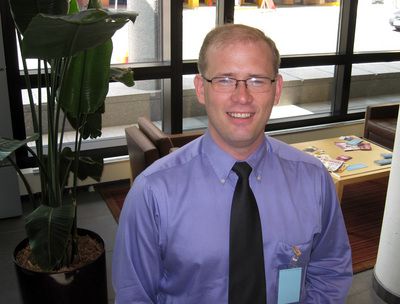14.5 million people in America are officially unemployed. Thousands — perhaps millions — more have given up and are not counted. They’re not numbers; they’re individuals with a story to tell.
John Armstrong, 39, of St. Paul knew there was “an air of streamlining” in the company for whom he managed a restaurant for eight years. But when he was let go in February, it still came as a shock. It was a lower-end restaurant and he thought he could survive the economic downturn that’s claimed the more upscale eateries.
He describes himself as “sickeningly optimistic,” but even the most optimistic job-seekers in America can occasionally suffer the debilitating reality that the first question we’re asked when we meet people is “what do you do?”
Armstrong looks for work. “I identify myself by the job I want,” he told me over coffee this morning. “There’s still a little bit of shame over being unemployed, but lots of people have been through it.” At times over the last five months, he acknowledged, he’s felt that maybe he hasn’t been able to get a job because “I’m not good enough to be employed.”
That’s when he looks at the numbers again. Everyone knows someone who’s unemployed. They’re losing their jobs and it’s not their fault.
Armstrong made about $44,000 a year — about $850 a week — at the restaurant in Woodbury. On unemployment, he gets about $470. In one interview, he said he indicated a desire for a salary of at least $35,000, but the manager told him others were willing to do the same job for $30,000. His benefits were due to run out next week, but the stimulus package extended them at least into next year.
John’s wife knows what he’s going through. She has been laid off twice, but now has a job with the state that allows their health care coverage to continue. His son, 17, had just been accepted to Hamline University when dad lost his job. “We all as a family decided we’ll make it work, that this is the right place to make it work.” Scholarships and loans have helped.
Armstrong estimates he’s had over a dozen interviews without success so far. Sometimes he’s called back for a second interview. He says he tries not to get “too up” over a prospective job. It’s not easy. “I sat down with a woman and interviewed with her for two-and-a-half hours. I realized I’d love to work for her. I’ve wanted to work for her company. She even sent me out the door with food.”
The next day she called to say her boss had hired someone else without telling her.
At least she called, he said. More often, people don’t call to say he didn’t get the job, and he doesn’t call them anymore to find out why not. “They’re pretty paranoid about what they say,” he said, a nod to the litigious society, perhaps.
The Internet makes unemployment easy, he notes. “I can sit at my desk and search for jobs.” Craigslist has been the most productive, he said. Once a week he also goes online and tells the state he didn’t work last week, and he did look for work. The dehumanization of the unemployment line is a thing of the past, at least in Minnesota.
He keeps in touch with another manager who lost his job at the same restaurant recently, passing along jobs that might not be a good fit for himself. “Isn’t he a competitor for the jobs you want?” I asked. Armstrong says if his colleague gets a job, it might open the door for him to get one, too.
There are bright spots to unemployment. “We’re managing to have a lot more fun. When I was working as a restaurant manager, I had to work weekends and holidays. Now we’re finding more things to do to have fun that don’t cost much,” he said.
You’ll note in the picture above, Armstrong has a shirt and tie. “I hope you didn’t dress up for me?” I said.
He didn’t. He has a job interview this afternoon.
(Unemployed? Let me tell your story. Contact me.)
Check out the map below to read what people in MPR’s Public Insight Network are telling us about the job climate around them.

